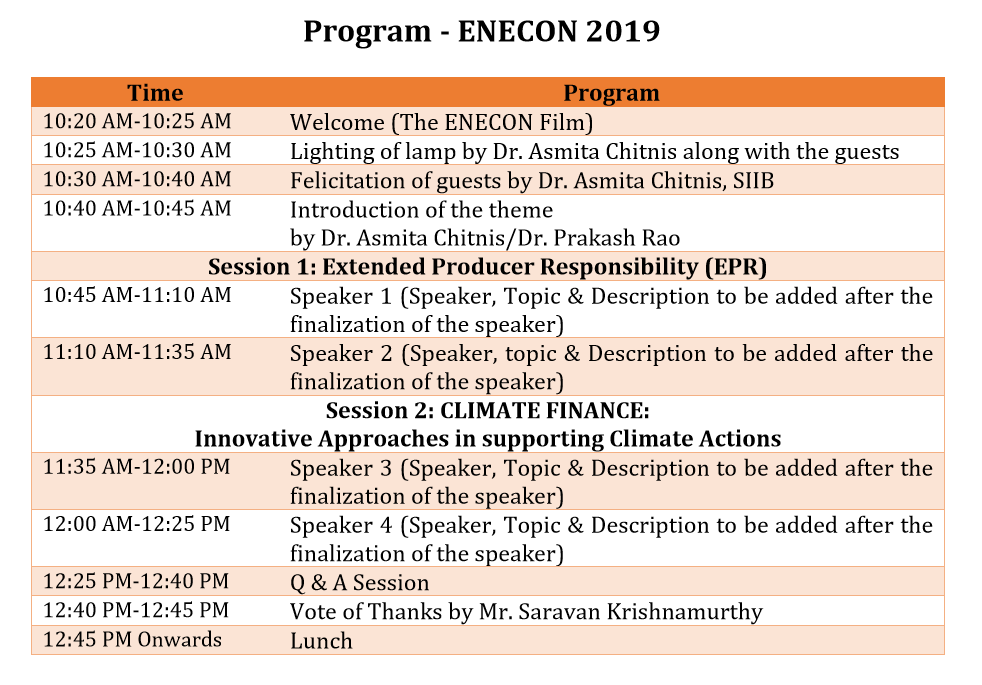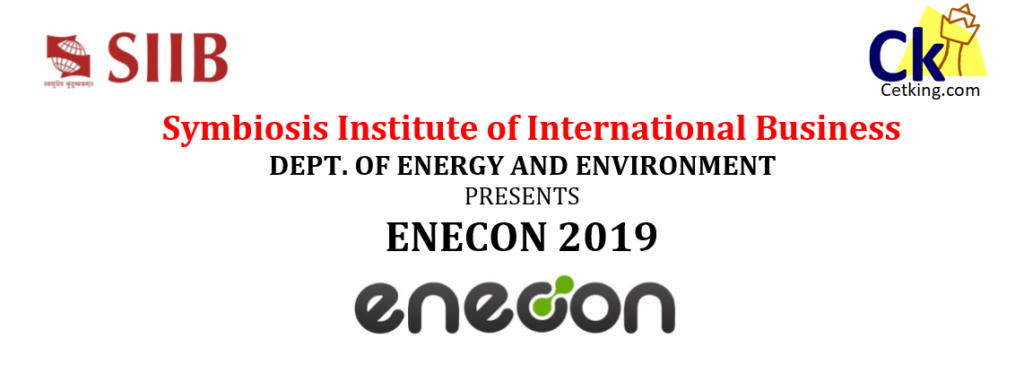ENECON is the annual flagship event of the Department of Energy and Environment at SIIB. This Conclave was launched in the year 2015, focusing on the shifting emphasis on green technology. Conducted successfully over the years, this event serves as a platform for the academia and the business corporates to collaborate and discuss various challenges and best practices in the industry.
With dynamic changes in the Energy and Environment sector, industries are integrating sustainability principles into their businesses. Sustainability principles help to drive growth by mitigating risks, enhancing opportunities and surpassing benchmarks. In its fifth installment, the ENECON theme is “Embrace, Nurture, Deliver,” which invites discussion on a wide spectrum of sustainable development subjects. This year, we encourage thoughts on a solution-based approaches practiced in industries.
Theme – EMBRACE NURTURE DELIVER
Humanity needs solutions for its current climate crisis. We can no longer dwell in deliberations; we need to begin real action. Global warming, over-exploitation of natural resources, increasing losses of biodiversity linked with various economic and social issues have become familiar plights of the planet. And, THERE IS NO PLANET B!
Thus, the inspiration for ENECON 2019 is drawn from a quote by Abraham Lincoln: “You cannot escape the responsibility of tomorrow by evading it today.”
The sooner we embrace the fact that Earth has to be saved, the better for our collective lives. ENECON 2019 opens vistas for us in multiple sectors viz. Renewable and non-renewable energy, Climate financing, Sustainability Studies, etc. We humbly invite your participation and partake in the proceedings to make a memorable conference.
Objective
The theme will impart valuable knowledge and influence young minds through interaction with industry experts. The insights into industry practices will help future corporates to undertake right actions by understanding business plans which will help to embrace the problems, nurture the ideas, and deliver the end-to-end solutions.
Topics for discussion
Session 1: Future of Clean Energy Transition
The climate change crisis is compelling countries to make a steady shift from conventional to cleaner sources of energy. The usage of renewable energy is gaining momentum as it is a more reliable and sustainable source. Depletion of fuel reserves seems to be inevitable. Power sector along with transportation being the largest sources of GHG emissions, emphasis on the use of renewables and electric vehicles (EVs) are being introduced in these sectors. As a result, developed and developing economies such as the EU, the USA, Japan, China and India have included Renewables Energy and EVs in their policies to lower their carbon emissions in an attempt to accentuate convenient and cost-efficient transportation.
Indian Government has increased the renewables target from 175 GW to 227 GW but it has various issues such as plaguing auctions and investment that would hamper the country from reaching its targets. Also, the recent cancellation of auctions risks jeopardizing investor confidence. Even various duties on equipment, lowering the tariffs, cutting down the subsidy by Government and the associated uncertainty has led to a short-term uptick in solar prices. This leads to a knock-on effect on already cash-strapped state distribution companies who are showing an unwillingness to greenlight high priced solar projects. The EV industry is facing severe challenges like retrofitting, advanced R&D, charging points for e-vehicles, infrastructure of grid development, technical concerns such as AC vs DC station and handling peak demand.
Indian Government has issued policies to support these actions such as FAME policy, National Wind-Solar Hybrid Policy etc. Apart from this, Climate Finance is one of the solutions to get investments in clean energy projects. Climate finance is needed for mitigation, because large-scale investments are required to significantly reduce emissions. Climate finance is equally important for adaptation, as significant financial resources are needed to adapt to the adverse effects and reduce the impacts of a changing climate. But the discussion of the hour is whether these policies helping industries on ground in solving the challenges and issues faced by them. Also, EV would be sustainable only if it utilizes more of the renewable energy rather than thermal sector.
Session 2: Extended Producer Responsibility (EPR)
In today’s eco-aware world, more organizations are adopting steps to become environmentally responsible in every activity. Waste Generation and disposal are today’s critical issues, and it has become imperative for companies to make conscious efforts towards an effective waste management system. Extended Producer Responsibility (EPR) holds the objective to reduce the environmental impacts of a product across its value chain. It becomes the producer’s responsibility to follow throughout the product’s life cycle, including its final disposal.
The producer is liable for ‘upstream impacts’ such as product design and production processes as well as ‘downstream impacts’ such as disposal of its products. Through the effective collection, treatment, reuse, and recycling of products, EPR can enhance product utilization in an environmentally friendly and socially desirable manner by channelizing the product life-cycle from ‘cradle to grave.’
India has implemented EPR for e-waste and plastics, as mentioned in E-Waste and Plastic Waste Management Rules 2018. Although the provisions of EPR in these rules seem viable, successful implementation of EPR depends on the ownership of waste and responsibility towards the environment, undertaken by producers for the end-life management of their products. Co-ordination between producers and pollution control boards is also a success determining factor. We aim to discuss essential success factors and deliberate on relevant key issues.



